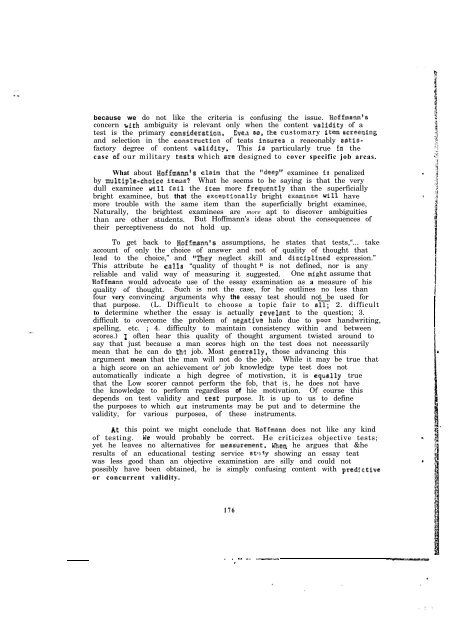Technical Report - International Military Testing Association
Technical Report - International Military Testing Association
Technical Report - International Military Testing Association
You also want an ePaper? Increase the reach of your titles
YUMPU automatically turns print PDFs into web optimized ePapers that Google loves.
ecause we do not like the criteria is confusing the issue. Hoffmann’s<br />
concern rfth ambiguity is relevant only when the content vaLidity of a<br />
test is the primary constd.eratFon. Eve,1 80, tke customary item acreesing<br />
and selection in the constructicn of teats insurea a reaeonably satiafactory<br />
degree of content valfdity. This io particularly true in the<br />
case of our military tests which are designed to cover specific job areas.<br />
What about Hoffa%M'S cLaim that the “deep” examinee fs penalized<br />
by multipLe-choice iteM? What he seems to be saying is that the very<br />
dull examinee will fail the itea more frequently than the superficially<br />
bright examinee, but that the exceptLonally bright examinec vi11 have<br />
more trouble with the same item than the superficially bright examinee,<br />
Naturally, the brightest examinees are more apt to discover ambiguities<br />
than are other students. But Hoffmann’s ideas about the consequences of<br />
their perceptiveness do not hold up.<br />
To get back to Hoffmann’s assumptions, he states that tests,“... take<br />
account of only the choice of answer and not of quality of thought that<br />
lead to the choice,” and “They neglect skill and dtsciplfned expression.”<br />
This attribute he catls “quality of thought I’ is not defined, nor is any<br />
reliable and valid way of measuring it suggested. One mfght assume that<br />
Hoffmann would advocate use of the essay examination as a measure of his<br />
quality of thought. Such is not the case, for he outlines no less than<br />
four very convincing arguments why the essay test should not be used for<br />
that purpose. (L. Difficult to choose a topic fair to a% 2. difficult<br />
to determine whether the essay is actually revelant to the question; 3.<br />
difficult to overcome the problem of negatfvc halo due to poor handwriting,<br />
spelling, etc. ; 4. difficulty to maintain consistency within and between<br />
scores.) I often hear this quality of thought argument twisted around to<br />
say that just because a man scores high on the test does not necessarily<br />
mean that he can do the job. Most generaLly, those advancing this<br />
argument mean that the man will not do the job. While it may be true that<br />
a high score on an achievement or’ job knowledge type test does not<br />
automatically indicate a high degree of motivstion, it is eqtially true<br />
that the Low scorer cannot perform the fob, that is, he does not have<br />
the knowledge to perform regardless of hie motivation. Of course this<br />
depends on test validity and test purpose. It is up to us to define<br />
the purposes to which oar instruments may be put and to determine the<br />
validity, for various purposea, of these instruments.<br />
At this point we might conclude that Hoffmann does not like any kind<br />
of testing. We would probably be correct. He criticizes objective tests;<br />
yet he leaves no alternatives for mensurement. When he argues that &he<br />
results of an educational testing service st*)qy showing an essay teat<br />
was less good than an objective examinstion are silly and could not<br />
possibly have been obtained, he is simply confusing content with predfctive<br />
or concurrent validity.<br />
176<br />
,. ^ .._ -.. .__.-<br />
.









